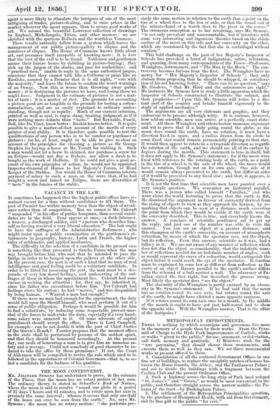VACANCY IN THE LAW.
IT sometimes has happened that the highest publio offices have re- mained vacant for a time without candidates to fill them. The post of Premier has within memory been thus the object of avoid- ance rather than of competition. But no sooner is Mr. Calcraft " suspended " in his office of public hangman, than several candi- dates are in the field. Four appear at once,—a dock-labourer, a weaver, a discharged soldier, and "a person who describes him- self as having received a very liberal education." The last ought to have the suffrages of the Administrative Reformers ; who might insist upon a public examination of the gentleman's at- tainments in geography, history, Latin and French, the higher roles of arithmetic, and applied mechanics. The difficulty in the selection of a candidate in the present case is something like that presented to Sancho Panza when the man was brought before him who said that he intended to pass the bridge in order to be hanged upon the gallows at the other side. In the present case the post is of such a kind that no man of real inteffigence and good. feeling could be a voluntary candidate. In order to be fitted for possessing the post, tbe man must be a des- perado of very low moral feelings, and undeserving of the suf- frages of those in whom the appointment lies. Calcraft had some excuse in seeking the situation ; for, they say, he inherited it, since his father was executioner before him. Yet Calcraft had feelings above his station ; he had "nerves," and was disqualified by being human. "Wanted a man bad enough !" If there were no man bad enough for the appointment, the duty would fall upon the Sheriff himself, who must perform it out of a sense of 'Salk obligation. Perhaps it would be possible for him to find a substitute by inducing some respectable provost-mar- shal of the forces to undertake the duty, especially if a very hand- some salary were annexed to it. Or some advocate of capital punishment should accept the office. There is Lord Campbell, for example : can he not double it with the post of Chief Justice of the Queen's Bench ? Fourier proposes that the meanest offices in the state shall be performed by persons of the noblest spirit, and that they should be honoured accordingly*. At the present day, our mode of honouring a man is to give him an immense sa- lary and a peerage. Could not somebody of good character be in- duced to take the office by those premiums ? If not, the Court of Aldermen will be compelled to revive the rule which used to be followed in the appointment of Colonial Governors—that is, to se- lect a candidate for the badness of his qualities.


























 Previous page
Previous page